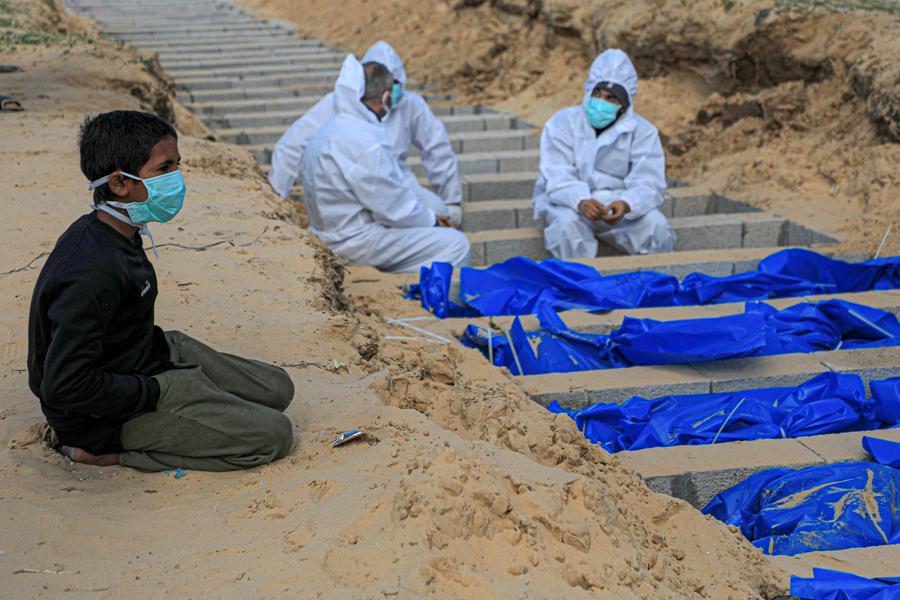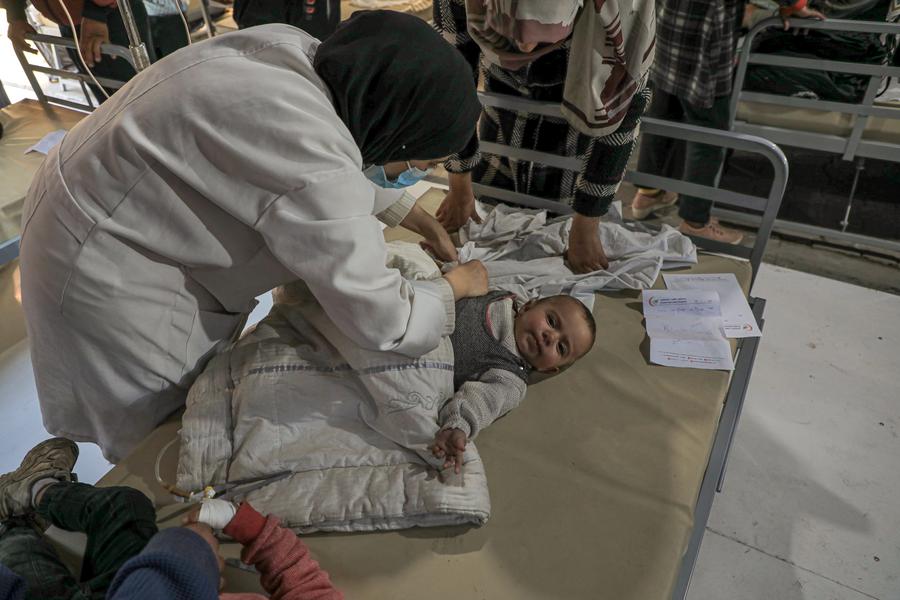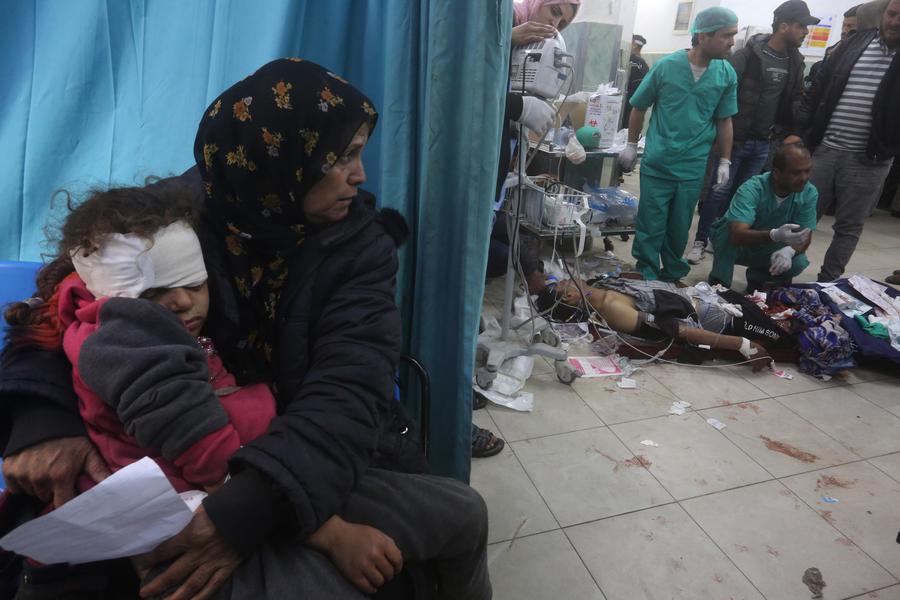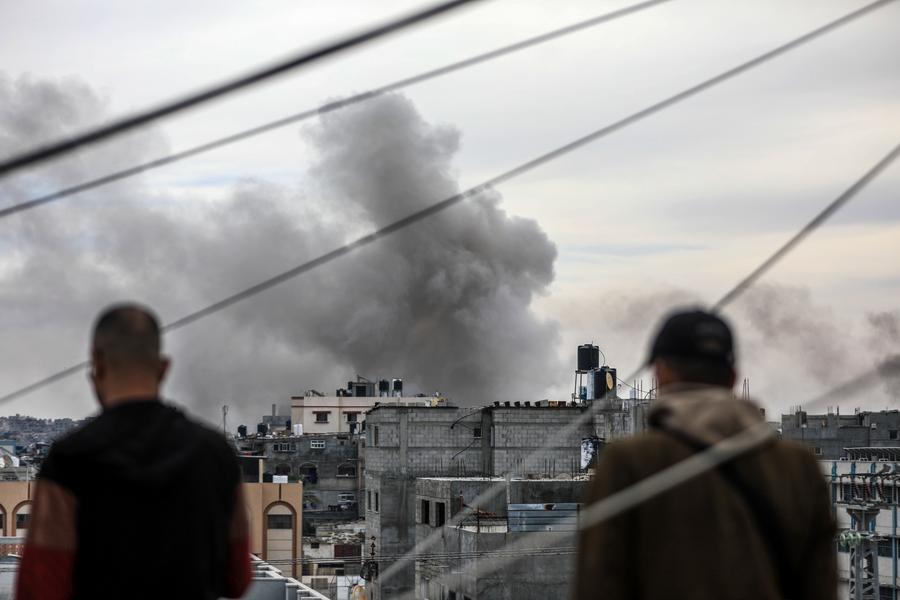Palestinian injuries' suffering double amid lack of treatment

A boy kneels by a grave for victims killed in the Hamas-Israel conflict in the southern Gaza Strip city of Rafah, on Jan. 30, 2024. (Photo by Rizek Abdeljawad/Xinhua)
GAZA, Jan. 31 (Xinhua) -- Lack of treatment in the Gaza Strip forces Abu Mustafa Salem, a 49-year-old Palestinian man, to deal with his injury by himself as the hospital is so far away from his tent.
The wounded man was the only survivor of his family in an Israeli attack that targeted his house in the Sheikh Redwan neighborhood in Gaza City two months ago. He was severely wounded and was transferred to a local hospital for treatment.
After staying at the hospital for a few days, he walked for ten km to the al-Nuseirat refugee camp. However, he could not find any medical staff there, forcing him to buy bandages and medicine to treat himself, he told Xinhua.
Treatments and disinfectants were unavailable in pharmacies or even in Rafah's hospitals amid a high number of injuries, Salem complained.

A child receives treatment at a temporary hospital in the southern Gaza Strip city of Rafah, on Jan. 25, 2024. Nearly 1.5 million people are now crammed inside Rafah governorate. Disease is spreading as the health system collapses. Only 16 of Gaza's 36 hospitals are even partly functional. That means the people of Gaza not only risk being killed or injured by relentless bombardments, they also run a growing chance of contracting infectious diseases, UN Secretary-General Antonio Guterres said on Tuesday. (Photo by Rizek Abdeljawad/Xinhua)
The same dire situation is experienced by Mohammed Attallah, another Palestinian, who was severely wounded in his right leg after an Israeli airstrike attacked his relatives' house in Khan Younis city in southern Gaza.
"I could barely recover from my injury, as I could not find treatment inside the hospitals," he said, adding there are no painkillers, so that most of the time, he was suffering from the pain.
Furthermore, the lack of meat, fruits and vegetables in the war-torn besieged coastal enclave delayed injuries' recovery amid the ongoing Israel-Hamas military conflict.

An injured man is treated at a hospital in the southern Gaza Strip city of Rafah, on Jan. 23, 2024. (Photo by Khaled Omar/Xinhua)
Ashraf al-Qedra, the spokesperson of the Hamas-run Health Ministry, told Xinhua that the health system in the Strip is on the verge of collapse in light of the continuation of the Israeli military operation.
He said that the Israeli army "deliberately destroyed health facilities and hospitals, including Al-Shifa Hospital, the largest in the Strip, Indonesian Hospital, Al-Awda Hospital, Kamal Odwan Hospital, Al-Mamadani Hospital, Al-Quds Hospital and other health centers."
Due to the Israeli offenses, the number of wounded and patients has accumulated, which currently accommodates more than 300 percent of their capacity, he added.
Meanwhile, the wounded remained lying on the ground in pain and bleeding, and surgical operations were being performed in the corridors.

Smoke rises following an Israeli airstrike in the southern Gaza Strip city of Khan Younis, on Jan. 21, 2024. (Photo by Yasser Qudih/Xinhua)
The residents of the Gaza Strip, home to about 2.3 million Palestinians, have been living in difficult conditions since October 7, 2023, after Israel declared a large-scale "war" in response to Hamas launching an unexpected military attack in southern Israel, killing about 1,200 Israelis.
Since then, the Israeli army has continued to launch its air, land, and sea attacks on the Gaza Strip, killing more than 26,900 Palestinians and wounding more than 65,949 others as of Tuesday, most of them women and children, according to what the Hamas-run Ministry of Health in Gaza announced.
Photos
Related Stories
- China calls for efforts to ease tensions in Red Sea
- Palestinian death toll in Gaza rises to 26,751: ministry
- UN chief to convene with key donors to ensure continued support for Palestine refugees relief work
- China hopes for effective implementation of ICJ ruling: FM spokesperson
- Palestinian death toll from Israeli attacks on Gaza rises to 26,637: ministry
Copyright © 2024 People's Daily Online. All Rights Reserved.









